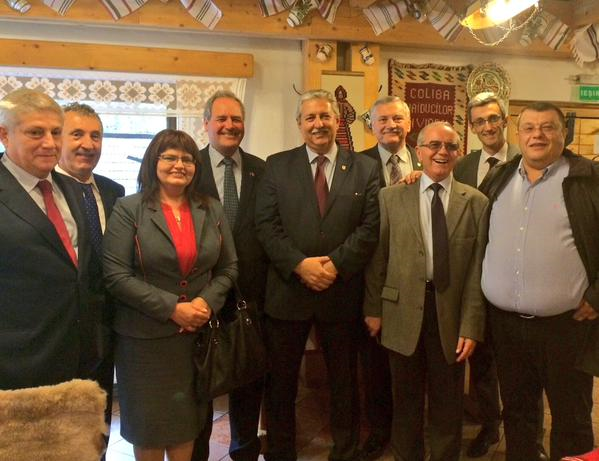

UK-Romania ties set to further strengthen
A six-member inter-parliamentary delegation led by Executive Committee member Bob Blackman MP visited Romania from 21-25 September 2015 to meet parliamentary counterparts in the Parliament of Romania. The delegation included Lord Davies of Stamford, Lord Harrison of Chester, Stephen Pound MP, Graham Jones MP and Philip Hollobone MP who has provided the following report.
Noroc! This a useful Romanian word as it can be used for ‘cheers!’ in a toast and also ‘bless you’ if you sneeze. Our small but perfectly formed delegation of four MPs and two Peers of the Realm soon became familiar with a select Romanian vocabulary as we spent the best part of five days getting to know Romania, its people, places and Parliamentarians.
Every day started with ‘’Bună dimineaţa’ – good morning – as we were whisked from briefing to meeting, with the first two full days spent in and around the world’s heaviest building. Romania’s Parliament in the capital Bucharest is housed in the ex-Ceausescu Palace of the Parliament, which is the world’s ‘largest civilian building with an administrative function’. It is seemingly lined with marble throughout and even the average meeting room dwarfs anything Committee Room 14 has to offer in the Palace of Westminster.
You would never imagine that Romania is a member of the Francophonie, because most of our hosts spoke good English and those that didn’t could mostly understand it. One of our hosts, 1970s heart-throb Senator Ilie Nastase not only spoke excellent English, but was a Wimbledon singles finalist in 1972 and 1976.
With 20 million people, Romania is the EU’s seventh most populous country, but the second least wealthy. Romania is a non-Slav nation surrounded by Slav states. Mainly Eastern Orthodox Christian, it is the largest of the Balkan countries. Bordering Ukraine to the north and the Black Sea to the east, Romania has been a very keen member of NATO since 2004 and is pledged to meet its 2% GDP spend on defence by 2017. “I am convinced Russia will never cease to try to rebuild its former empire”, was one comment made strongly to us during the week. Since EU entry in 2007, it has lost 10% of its population, mainly to Italy and Spain but with an increasing number also in the UK, resulting in a ‘brain drain’.
Many feel there was a lost opportunity to include Moldova (3 million people – the former Bessarabia) back within Romania when the Iron Curtain came down and today the two countries remain very close. Romania was the first European country to produce oil, though its sources are now running low. Outside the Eurozone, Romania is also formally outside Schengen, but operates its borders largely as if it were a Schengen member. However, it remains unenthusiastic about taking Middle East refugees, instead arguing that they would rather settle in Germany.
Incantat sa va întalnesc! – I’m delighted to meet you. In a series of meetings, we were privileged to meet and exchange views with Senators and Deputies from the foreign policy, European affairs, defence, public order, national security and energy committees. As well as meeting the Presidents of both the Chamber of Deputies and the Senate, we also met government ministers responsible for energy, the Roma community, defence, foreign affairs, and the economy, trade and tourism. We also met the enthusiastic team at the British Council in Bucharest, which is humming with activity and making far more of an impact than its French and German equivalents. We were very well looked after by the Romanian IPU Group throughout. Mulţumesc! Thank you!
100 miles north of the capital we visited the picturesque, ancient Germanic town of Brasov in Transylvania, nestled in the foothills of the Carpathians. The Carpathians divide Romania in two, the lands on the west having formed part of the Austro-Hungarian empire until 1918. Previously named (for 700 years) Kronstadt and then in the 1950s, Orasul Stalin – Stalin City, when it became a town producing tractors, Brasov had a mainly ethnic German population who left for Germany when Ceausescu fell.
In Brasov is located Romania’s first hospice, which was started by its enterprising British founder Graham Perolls in 1992. Casa Sperantei began life with just one UK nurse training a Romanian nurse and visiting patients in their own homes. It now employs 100+ staff and has a 20 bed in-patient unit for adults and children, day care centres and out-patient clinics, along with social and spiritual services. It has become recognized as a centre of excellence providing hands-on clinical placements for medical professionals across the country.
We also left the capital to visit Romania’s leading nuclear physics facility at Magurele. Injected with EU funding, it accounts for 10% of Romania’s science base and is developing cutting edge research into the development of lasers and ion beams and is hoping to be the catalyst for a regional high-tech cluster.
UK Ambassador Paul Brummell and his team provided us with excellent support throughout our visit. A first class pre-brief before leaving London and a welcome at the Residence at the start of the visit were followed by a midweek evening with Embassy staff , British ex-pats and leading Bucharest professionals in the new Embassy pub ‘The Wessex Arms’ – recently opened by the Duke and Duchess.
It is clear that the Romanians like the British and that we like the Romanians. However, there is too little knowledge in the UK about Romania and what it has to offer. Whether or not the UK stays in the EU, ties between our two countries look set to strengthen due to our shared energy and defence interests and Romania’s increasing enthusiasm for the English language.













